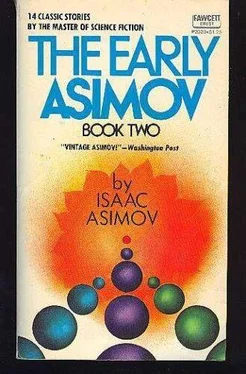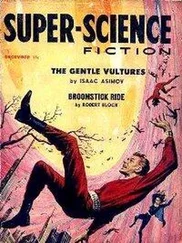Isaac Asimov - The Early Asimov. Volume 2
Здесь есть возможность читать онлайн «Isaac Asimov - The Early Asimov. Volume 2» весь текст электронной книги совершенно бесплатно (целиком полную версию без сокращений). В некоторых случаях можно слушать аудио, скачать через торрент в формате fb2 и присутствует краткое содержание. Год выпуска: 1986, ISBN: 1986, Издательство: Del Rey, Жанр: Фантастика и фэнтези, на английском языке. Описание произведения, (предисловие) а так же отзывы посетителей доступны на портале библиотеки ЛибКат.
- Название:The Early Asimov. Volume 2
- Автор:
- Издательство:Del Rey
- Жанр:
- Год:1986
- ISBN:ISBN: 034-532589-3
- Рейтинг книги:5 / 5. Голосов: 1
-
Избранное:Добавить в избранное
- Отзывы:
-
Ваша оценка:
- 100
- 1
- 2
- 3
- 4
- 5
The Early Asimov. Volume 2: краткое содержание, описание и аннотация
Предлагаем к чтению аннотацию, описание, краткое содержание или предисловие (зависит от того, что написал сам автор книги «The Early Asimov. Volume 2»). Если вы не нашли необходимую информацию о книге — напишите в комментариях, мы постараемся отыскать её.
The Early Asimov. Volume 2 — читать онлайн бесплатно полную книгу (весь текст) целиком
Ниже представлен текст книги, разбитый по страницам. Система сохранения места последней прочитанной страницы, позволяет с удобством читать онлайн бесплатно книгу «The Early Asimov. Volume 2», без необходимости каждый раз заново искать на чём Вы остановились. Поставьте закладку, и сможете в любой момент перейти на страницу, на которой закончили чтение.
Интервал:
Закладка:
His skinny finger punched Pelham in the stomach.
'No!' yowled Pelham vehemently. 'Hell, no!'
But the Ossie wasn't listening. He plunged the globe deep into the warmth of his feathers and said:
'Pitty colors. How long take for little Sannycaws come out? And what little Sannycaws eat?' He looked up. 'We take good care. We teach little Scannycaws, make him smart and full of brain like Ossie.'
Pierce grabbed Commander Pelham's arm.
'Don't argue with them,' he whispered frantically. 'What do you care if they think those are Santa Claus eggs? Come on! If we work like maniacs, we can still make the quota. Let's get started.'
'That's right,' Pelham admitted. He turned to the Ossie. Tell everyone to get going.' He spoke clearly and loudly. 'Work now. Do you understand? Hurry, hurry, hurry! Come on!'
He motioned with his arms. But the frowzy Ossie had come to a sudden halt. He said slowly:
'We work, but Johnson says Kissmess come evvy year.'
'Isn't one Christmas enough for you?' Pelham rasped.
'No!' squawked the Ossie. 'We want Sannycaws next year. Get more eggs. And next year more eggs. And next year. And next year. And next year. More eggs. More little Sannycaws eggs. If Sannycaws not come, we not work.'
'That's a long time off,' said Pelham. 'We'll talk about it then. By that time I'll either have gone completely crazy, or you'll have forgotten all about it.'
Pierce opened his mouth, closed it, open his mouth, closed it, opened it and finally managed to speak.
'Commander, they want him to come every year.'
'I know. They won't remember by next year, though.'
'But you don't get it. A year to them is one Ganymedan revolution around Jupiter. In Earth time, that's seven days and three hours. They want Santa Claus to come every week.' 'Every week!' Pelham gulped. 'Johnson told them -' For a moment everything turned sparkling somersaults before his eyes. He choked, and automatically his eye sought Olaf.
Olaf turned cold to the marrow of his bones and rose to his feet apprehensively, sidling toward the door. There he stopped as a sudden recollection of tradition hit him. Beard a-dangle, he croaked:
'Merry Christmas to all, and to all a good night!' He made for the sleigh as if all the imps of Hades were after him. The imps weren't, but Commander Scott Pelham was.
In January of 1941 (the month in which I attained my majority), I undertook something new - a collaboration.
Fred Pohl, after all, was not merely an editor. He was also a budding writer. He has since come to be a giant in the field, but in those early days he was struggling along with only the sort of meager success I was having. Alone, and in collaboration with other Futurians, he turned out stories under a variety of pseudonyms. The one he used most frequently was 'James MacCreigh.'
As it happened, he had written, under that pseudonym, a small fantasy called 'The Little Man on the Subway,' which he apparently-had hopes for but couldn't get right. He asked me if I would rewrite it, and the request flattered me. Besides, I was still trying to get into Unknown, and if I couldn't do it on my own, maybe I could do it by way of a collaboration. I wasn't proud - at least as far as fantasy was concerned.
I took on the task and did it virtually at a sitting. Doing it easily didn't help, however. I submitted it to Campbell for Unknown on January 27, 1941, and he rejected it. I had to hand it back to Pohl.
Pohl, however, with the true agent's soul, never gave up, and in 1950, long after I had utterly forgotten it, he managed to place it with a small magazine called Fantasy Book.
The Little Man on the Subway (with James MacCreigh) [7]
Subway stations are places where people usually get out, so when no one left the first car at Atlantic Avenue station, Conductor Cullen of the I.R.T. began to get worried. In fact, no one had left the first car from the time the run to Flatbush had begun - though dozens were getting on all the time.
Odd! Very odd! It was the kind of proposition that made well-bred conductors remove their caps and scratch their heads. Conductor Cullen did so. It didn't help, but he repeated the process at Bergen Street, the next station, where again the first car lost not one of its population. And at Grand Army Plaza, he added to the headscratching process a few rare old Gaelic words that had passed down from father to son for hundreds of years. They ionized the surrounding atmosphere, but otherwise did not affect the situation.
At Eastern Parkway, Cullen tried an experiment. He carefully refrained from opening the first car's doors at all. He leaned forward eagerly, twisted his head and watched - and was treated to nothing short of a miracle. The New York subway rider is neither shy, meek nor modest, and doors that do not open immediately or sooner are helped on their way by sundry kicks. But this time there was not a kick, not a shriek, not even a modified yell. Cullen's eyes popped.
He was getting angry. At Franklin Avenue, where he again contacted the Express, he flung open the doors and swore at the crowd. Every door spouted commuters of both sexes and all ages, except that terrible first car. At those doors, three men and a very young girl got on, though Cullen could plainly see the slight bulging of the walls that the already super-crowded condition of the car had caused.
For the rest of the trip to Flatbush Avenue, Cullen ignored the first car completely, concentrating on that last stop where everyone would have to get off. Everyone! President, Church and Beverly Road were visited and passed, and Cullen found himself counting the stations to the Flatbush terminus.
They seemed like such a nice bunch of passengers, too. They read their newspapers, stared into the whirling blackness out the window, or at the girl's legs across the way, or at nothing at all, quite like ordinary people. Only, they didn't want to get out. They didn't even want to get into the next car, where empty seats filled the place. Imagine New Yorkers resisting the impulse to pass from one car to the other, and missing the chance to leave the doors open for the benefit of the draft.
But it was Flatbush Avenue! Cullen rubbed his hands, slammed the doors open and yelled in his best unintelligible manner, 'Lasstop!' He repeated it two or three times hoarsely and several in that damned first car looked up at him. There was reproach in their eyes. Have you never heard of the Mayor's anti-noise campaign, they seemed to say.
The last other passenger had come out of the train, and the scattered new ones were coming in. There were a few curious looks at the jammed car, but not too many. The New Yorker considers everything he cannot understand a publicity stunt.
Cullen fell back on his Gaelic once more and dashed up the platform toward the motorman's booth. He needed moral assistance. The motorman should have been out of his cab, preparing for his next trip, but he wasn't. Cullen could see him through the glass of the door, leaning on the controls and staring vacantly at the bumper-stop ahead.
'Gus!' cried Cullen. 'Come out! There's a hell of-'
At that point, his tongue skidded to a halt, because it wasn't Gus. It was a little old man, who smiled politely and twiddled his fingers in greeting.
Patrick Cullen's Irish soul rebelled. With a yelp, he grabbed the edge of the door and tried to shove it open. He should have known that wouldn't work. So, taking a deep breath and commending said Irish soul to God, he made for the open door and ploughed into the mass of haunted humans in that first car. Momentum carried him six feet, and then there he stuck. Behind him, those he had knocked down picked themselves up from the laps of their fellow-travelers, apologized with true New York courtesy (consisting of a growl, a grunt, and a grimace) and returned to their papers.
Читать дальшеИнтервал:
Закладка:
Похожие книги на «The Early Asimov. Volume 2»
Представляем Вашему вниманию похожие книги на «The Early Asimov. Volume 2» списком для выбора. Мы отобрали схожую по названию и смыслу литературу в надежде предоставить читателям больше вариантов отыскать новые, интересные, ещё непрочитанные произведения.
Обсуждение, отзывы о книге «The Early Asimov. Volume 2» и просто собственные мнения читателей. Оставьте ваши комментарии, напишите, что Вы думаете о произведении, его смысле или главных героях. Укажите что конкретно понравилось, а что нет, и почему Вы так считаете.







